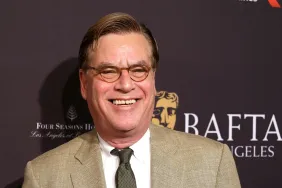The gory sci-fi thriller starring Jude Law and Forest Whitaker

You might not be able to tell from the name, but you certainly can tell from watching his futuristic sci-fi action-thriller Repo Men that director Miguel Sapochnik is British. You can partially tell because his first feature film as a director draws influence from the sci-fi classics of England’s finest, whether it’s Ridley Scott’s “Blade Runner” or Stanley Kubrick’s “A Clockwork Orange,” but with a tone clearly inspired by the work of Terry Gilliam and Monty Python.
The movie takes place in the near future where people can buy artificial replacement organs that are so ridiculously expensive they require complex installment plans, and once someone reneges on their payments, the company sends their top enforces to reclaim said organs. Jude Law and Forest Whitaker play Remy and his long-time friend Jake, two such repo men for The Union. When a job goes horribly wrong, Remy himself is retrofitted with an artificial heart, but unable to pay for it, he’s forced to go on the run from his former colleagues in the Union. It also stars Alice Braga from I Am Legend as Beth, another victim of the system who joins Remy on the lamb.
With a premise that pays homage to Philip K. Dick, a thriller like this could have easily been very dark but Sapochnik brings a distinct tone of humor to it, as well as some of the most scrumptious gore we’ve seen in some time as Remy and Jake find interesting new ways of reclaiming internal organs. (The combination of action and humor makes it feel like something Crank directors Neveldine and Taylor might have come up with if they were British.)
Sapochnik comes from the world of art, having provided storyboards for some of Danny Boyle’s early films including Trainspotting, before going on to direct the award-winning sci-fi short called “The Dreamer.” ShockTillYouDrop sat down with the British director last week to talk about what it took to finally get Repo Men to the screen.
ShockTillYouDrop: Although you’ve been trying to develop various projects over the years, this is kind of your debut, and it seems like a fairly complex movie to take on as a first feature film. How did this come your way? Did you meet the writer Eric Garcia, hit it off and it just went from there?
Miguel Sapochnik: I was introduced to the writers through the script in 2004. Actually, when I first read the script I read it and I thought, “Wow, no one’s ever gonna make this movie,” and just put it aside. It was really well written, really interesting, but you just couldn’t see how it would ever be made. Then it just kicked around in my head for so long, I think for about three or four months that eventually I picked it up and I thought, “Oh wait a minute, if we were going to make it, let’s just say hypothetically that someone would actually want to put money into this, how would one go about it?” It developed from there, so it was quite a few â very few years of development and then it was about finding a team, particularly in terms of financing and producing that understood the time because you’re walking a line between what could end up being a bad B movie or what could be a kind of a satire or an ironic comic look at the possible future. I think that was really kind of really kicked in when Jude read the script in 2006. I think mid 2006 he read the script and that’s when it started to have legs. That’s when the reality, the possibility of it actually happening started to â you could see it on the horizon.
Shock: I don’t know when the novel first came out, but was it Eric who decided he wanted to adapt it into a screenplay himself?
Sapochnik: Basically Eric wrote a short story called “The Telltale Pancreas” which he wrote back in ’97. From that he wrote the first version of the novel which I think he finished around 2000. Then, it was 2001, I believe, that he met Garrett. Their kids go to school together, and Garrett Lerner who writes “House,” and the two of them became friends and Eric gave the manuscript to Garrett and Garrett said, “Hey, you should write a movie out of this.” So they actually wrote together I think, I think they wrote it in 2001. So the first draft of the movie was in 2001. But if you read the novel, the novel’s very different from the movie.

Shock: I was curious about that because it has such a different tone from other movies. Was a lot of the humor and tone of the movie in the book already?
Sapochnik: Eric’s writing is inherently humorous, I mean, he has a very European sensibility even though he’s kind of American, Jewish with a Spanish last name and a strange background.
Shock: Yeah, you have to be funny with that kind of background.
Sapochnik: Yeah, it’s funny, and Garrett as well, Garrett has a very, very funny, but very dark sense of humor. I think that that humor was inherent in the people that were writing the script. Then, I think the idea requires a certain absurdist approach to put it off. For me, my big inspiration when I thought, “Well, how would you make this movie?” was the Monty Python “Meaning of Life” sketch. I mean, it’s in the movie. I love the humor of Monty Python. I always remember being so impressed by how violent Monty Python are actually when you look at what they do. Terry Gilliam has a great way of kind of proposing violence. Even Terry Jones in “The Search for the Holy Grail” when he’s kinda cutting the guy up into pieces and he’s saying, “You know, it’s just a flesh wound. They were very violent movies, but there’s humor in that violence and there’s irony in it. So when I saw that⦠I mean, I must’ve seen the Monty Python thing, I can’t remember, probably when I was 10 for the first time. It’s always just struck me as on the one hand I was terrified by it and at the same time I couldn’t help but laugh, so combining those two things together. For me, another great influence would be “Evil Dead 2” or “A Clockwork Orange.” They’re movies that combine horror and comedy, but there’s a certain thing to them where it’s like the best combination.
Shock: Dark comedy is always a bit of a hard sell anyway, so did you have trouble convincing people that the combination of Jude Law and Forest Whitaker would work? It’s a strange combination even on paper, and before I saw the movie, I couldn’t imagine the two of them doing anything like this.
Sapochnik: Well, I think that’s why it was so hard to imagine someone wanting to make this in the first place because it was always humorous. It had a lot of tough to get around scenes with a certain sort of sensibility in it. I think that persuading people that we were gonna make something that was essentially somehow an anti-corporate movie, and we needed a corporation to make it was a hurdle in of itself. Then, once we actually shot it, I mean, there’s a cut of this movie that is really, really funny. What happened is that we had to, in the end, whilst looking at that we were like, “Okay, we need to balance this satire out with a sellable Hollywood movie.” So we found a medium in between. I think that that was an important part of the process because if it had been up to me I would’ve just let it go the whole nine yards into Monty Python. I was being told, “You’ve gotta bring it back because you’re gonna lose half your audience and we want to hold onto people.” One of the things I said I’ve always felt about the movie and I feel very strongly about now is (that) setting the tone was very important, but there is no inappropriate moment to laugh in this film. It doesn’t take itself too seriously, it’s not meant to. I mean, it has a social comment. Sci-fi’s great, but you don’t have to hit people over the head with it when you’re making a social comment. It just inherently exists within the fabric of the story.
Shock: You mentioned Terry Gilliam, and he has had a lot of trouble over the years making movies like “Brazil’ the way he wanted them to be, it was almost impossible . Being a first-time filmmaker other than your shorts, was it a lot harder dealing with the corporate thing?
Sapochnik: Yeah, I mean, it’s making a studio movie. When you’re making a studio movie and it’s not a studio subject. I think one of the advantages of this story is that the idea, the proposition that in the future you will be able to buy artificial organs, but you also have to pay for them, absurd amounts of money, and they’ll get repossessed if you don’t pay for them, that is a saleable item, so the commercial value, one of the immediate proponents of this film on the studio side was to Adam Fogelson who was then the Head of Marketing and is now one of the heads of the studio and because he saw the film and he just thought, “I know how to sell this.” I think that that’s a very important part of getting anything made nowadays.

Shock: Who came up with the idea of casting Forest? In the original novel, was Jake a large imposing black man as well?
Sapochnik: No, to be honest with you it’s totally random. Jude came on board a year before the movie got going, so he was kind of in the trenches with me already. Then we were looking down the line of what would be a good Jake. Forest had just won an Oscar and we needed somebody who added not just kudos, but backed-up the budget that we were asking for which was still very small. We needed to augment it, because that’s how they package these movies together. The thought of Forest came up and it just for probably all the reasons that you’ve mentioned seemed like, “Well, there’s no reason why not.” The only why not is because maybe we see them as this odd couple. It just seemed like an odd couple to pair together. But I think that that’s the idea, it was always based â that relationship for me anyway, was based on â one of my favorite characters is Begbie from “Trainspotting” played by Robert Carlyle and I love the fact that Kevin McKidd’s character at some point tells a story about Begbie killing a whole bunch of people, not killing, you know, attacking a whole bunch of people in a pub and then turns around and says, “That guy’s fucking crazy, but he’s a mate, so what can you do?” That’s Jake. He’s my mate, so what can you do?
Shock: Also, can you talk about putting together an international cast for this? Carice van Houten hasn’t done a lot of work here so it’s nice seeing her in a role like this.
Sapochnik: Yeah, I mean, Carice I’d seen in “Black Book,” she was amazing. I saw a lot of actresses for Alice Braga’s part. Alice just lit it up when she showed up. There wasn’t a conscious choice to make everybody from a different country, but somehow it ended up that way. Liev again as Frank was almost a last-minute addition. We were already in shooting when he showed up. But I think that whether unconsciously or consciously it spoke to the globalization of the world that we were talking about, the idea that everything in the movie⦠you may notice there’s this idea that we have that the Chinese have bought everything, which is what they’re in the process of doing anyway. There’s this constant reference⦠every English sign also has Chinese underneath it
Shock: That would seem like a bit of an homage to “Blade Runner,” I would think.
Sapochnik: Well, it’s just a natural progression. When we set out to build the world for this film, we very specifically said to ourselves, “I don’t want to have a âBlade Runner’ world.” I don’t want to have a post-apocalyptic blue and brown world. What I want to have is a colorful and kind of exciting and fun-looking world which will play against the kinda dark humor. We also have to accept that the reality is is buildings will get bigger. Eventually we were gonna do this fake report where there was gonna be the fourth failed attempt at a flying car. There’s a tragedy when the driver got killed when the whole thing went wrong. But so, the idea ultimately is we thought, “Let’s imagine that this is when they just start â there’s an influx of money that comes from the Chinese and everyone starts building.” So that’s why the city shots you get all have huge amounts of cranes in them, it’s like Dubai, it’s like looking at this is the beginning. This is 25 years before the “Blade Runner” world exists.
Shock: Having shot this in Toronto, what was involved with turning it into this futuristic city. Did you end up doing a lot more post-production than you imagined to create this world?
Sapochnik: No, I think originally we were going to shoot it in Argentina. That was the starting point and the reason was is that Argentina has all this colonial architecture mixed in with very, very new architecture. Buenos Aires is an incredibly kind of fragrant city, a beautiful city to look at and it has the old and the new. Then, I think the studio decided that was a little too far for them to let us go with all their money. We looked at other possibilities â we looked at Chicago and in the end we ended up in Toronto. I think at first I was reluctant, because I know Toronto’s been shot in and doubled for in lots of stories. Then once I got around the idea of thinking, “Actually, why don’t we set this in Toronto? Why don’t we not shy away from the Canadianisms of Toronto?” We never specifically say (it), but we also don’t get rid of the CN Tower which is in full view in the very first shot of the film. I think once we played around with that idea, and we kind of recognized that, and we didn’t try and shy away from what we were doing, we started looking for interesting locations. For example, the scene that happens on the freighter originally was set in an abandoned house, but the production designer was driving down passed the docks with the location manager and sees a freighter and just goes, “Go on, let’s go and have a look at that. Why do we have to set this in an abandoned house?” So Toronto in a way, the potential limitations that we perceived became what augmented the actual final movie and made it more interesting looking.

Shock: I’m sure you’ve been asked a lot about the similarities between this and Darren Bousman’s “Repo: The Genetic Opera,” which was actually shooting in Toronto just before or after you.
Sapochnik: I think just before.
Shock: So was it just something in the ether that had these two very different movies about a similar subject happening at roughly the same time?
Sapochnik: Yeah, pretty much. As far as I was concerned we were told when we were about to kind of get going on our movie that there was another movie called “Repo: The Genetic Opera” and we were asked, did we have any connection to them or something? We didn’t. So, we just got on doing our thing. I mean, they’re very different even if it’s the same story.
Shock: Well, it’s not even the same story.
Sapochnik: But I guess it’s the same premise. The same premise existed in both of them, but I think that ⦠I know that there’s a chicken and egg thing going on with them, butâ¦
Shock: I don’t even think it’s that, because the movies are so different that someone who likes one movie won’t necessarily like the other and vice versa. I really got a kick out of the line towards the end when Remy shows Jake the novel he’s written called “The Repossession Mambo” and Jake says, “That’s a stupid title.” Was that something Eric originally had in the book? Because the movie’s title changed to “Repo Men,” it’s funny on another level, so did you know while you were shooting that the title was going to change?
Sapochnik: No, I mean, I’ve always been a huge fan of “The Repossession Mambo.” It fits into the story with him talking about the mambo being the way some people danced as they’re going into the great beyond and the book at the end had that reference. I think it ultimately came down to if you said “The Repossession Mambo” to people in the Midwest, they’re gonna go, “Huh?” Then if you say, “Repo Men,” then there is a point of reference.
Shock: They know what that is.
Sapochnik: So if it comes down to bottoms on seats, then I guess you gotta get behind it. It works very well, because he says it as an in-joke for us.
Shock: So what are you doing next? I don’t know how long you’ve had this movie finished, but have you started working on something else?
Sapochnik: I’m going to get through the next 10 days and have this movie come out and I’m going to sit down and look at my life and decide what I do next.
Shock: Have you thought about going back and developing your short into a feature-length movie? I know you were trying to do that at one point.
Sapochnik: No, I mean, I’d love to do that. I think that what I would like to do, if anything, is the antithesis of what I’ve just done. I was actually meant to go to Argentina and shoot a very low budget movie about psychotherapists having a midlife crisis who decides to become an assassin.
Shock: That would be very different from this.
Sapochnik: Yeah, I like doing different stuff, so I’m not sure yet.
Repo Men opens everywhere on March 19. Look for our exclusive interview with actor Forest Whitaker next week over on ComingSoon.net.




Source: Edward Douglas









